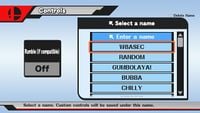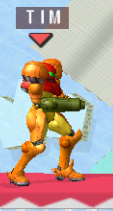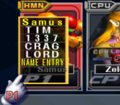Name: Difference between revisions
mNo edit summary |
mNo edit summary |
||
| Line 8: | Line 8: | ||
Players can input a short string of characters as a name to use in gameplay, in which it will appear above the character. Names can be up to four characters long in ''Melee'', up to five in ''Brawl'', and up to ten in ''for Wii U'' and ''Ultimate''. | Players can input a short string of characters as a name to use in gameplay, in which it will appear above the character. Names can be up to four characters long in ''Melee'', up to five in ''Brawl'', and up to ten in ''for Wii U'' and ''Ultimate''. | ||
The [[Records]] menu allows the viewing of separate records for [[knock-out]]s, [[self-destruct]]s, [[damage]] taken, [[pratfall]]s and the like for each name. It is also possible to associate some controller preferences to each name, such as the [[Rumble]] option or - starting with ''Brawl'' - control schemes different from the default; this allows | The [[Records]] menu allows the viewing of separate records for [[knock-out]]s, [[self-destruct]]s, [[damage]] taken, [[pratfall]]s and the like for each name. It is also possible to associate some controller preferences to each name, such as the [[Rumble]] option or - starting with ''Brawl'' - control schemes different from the default; this allows for quick access to preferred configurations without manually adjusting every time. | ||
In ''Brawl'', names can be transferred to the [[Wii Remote]] and can then be transferred to another [[Wii]] console. [[KO Stars]] are temporarily awarded to a given name profile for scored KOs, lasting until the player exits [[Versus Mode]] or changes their name. | In ''Brawl'', names can be transferred to the [[Wii Remote]] and can then be transferred to another [[Wii]] console. [[KO Stars]] are temporarily awarded to a given name profile for scored KOs, lasting until the player exits [[Versus Mode]] or changes their name. | ||
| Line 18: | Line 18: | ||
In rare cases, names may affect gameplay. For example, in ''[[Melee]]'', name tags remain visible even if they are pointing to an invisible character, making it easier to [[punish]] teleportation special moves such as [[Farore's Wind]] and [[Vanish]]. As such, {{SSBM|Sheik}} players will almost never use name tags in competitive matches. | In rare cases, names may affect gameplay. For example, in ''[[Melee]]'', name tags remain visible even if they are pointing to an invisible character, making it easier to [[punish]] teleportation special moves such as [[Farore's Wind]] and [[Vanish]]. As such, {{SSBM|Sheik}} players will almost never use name tags in competitive matches. | ||
In | In ''For Wii U'' and ''Ultimate'', due to the lack of voice chat when playing any of the [[With Anyone]] and [[Quickplay]] modes online, some players use names as a means of communicating with other players, sending messages such as "good game". However, this also allows opportunities for [[griefing]] by making intentionally offensive and obscene names that the opponent is unable to stop beyond reporting players after the fact. Nintendo combats this by by creating a "banned words list" in the console firmware to prevent players from using words on the list. This creates a game of cat and mouse where players constantly find new words as workarounds and Nintendo frequently has to update the list to add these new words to it. | ||
==Name Entry== | ==Name Entry== | ||
{{Incomplete|Character sets for SSB4}} | {{Incomplete|Character sets for SSB4}} | ||
Revision as of 19:40, December 13, 2023
- "Name Entry" redirects here. For the glitch involving the entry, see Name Entry glitch.
- "Tag" redirects here. For the French smasher, see Smasher:Tag.
Names are a feature in Super Smash Bros. Melee, Super Smash Bros. Brawl, Super Smash Bros. for Wii U, and Super Smash Bros. Ultimate.
Players can input a short string of characters as a name to use in gameplay, in which it will appear above the character. Names can be up to four characters long in Melee, up to five in Brawl, and up to ten in for Wii U and Ultimate.
The Records menu allows the viewing of separate records for knock-outs, self-destructs, damage taken, pratfalls and the like for each name. It is also possible to associate some controller preferences to each name, such as the Rumble option or - starting with Brawl - control schemes different from the default; this allows for quick access to preferred configurations without manually adjusting every time.
In Brawl, names can be transferred to the Wii Remote and can then be transferred to another Wii console. KO Stars are temporarily awarded to a given name profile for scored KOs, lasting until the player exits Versus Mode or changes their name.
In Ultimate, names not only appear in the tag floating above the character, but also in their damage meter, replacing the character's name (except when playing online, which instead displays the name of the Nintendo Switch's current user). A player's name tag also appears over any Assist Trophy or Poké Ball Pokémon that fighter has summoned.
Starting in Brawl, names appear on the multiplayer results screen, and in Ultimate, they appear in the fighter splash screen before a match starts.
In rare cases, names may affect gameplay. For example, in Melee, name tags remain visible even if they are pointing to an invisible character, making it easier to punish teleportation special moves such as Farore's Wind and Vanish. As such, Sheik players will almost never use name tags in competitive matches.
In For Wii U and Ultimate, due to the lack of voice chat when playing any of the With Anyone and Quickplay modes online, some players use names as a means of communicating with other players, sending messages such as "good game". However, this also allows opportunities for griefing by making intentionally offensive and obscene names that the opponent is unable to stop beyond reporting players after the fact. Nintendo combats this by by creating a "banned words list" in the console firmware to prevent players from using words on the list. This creates a game of cat and mouse where players constantly find new words as workarounds and Nintendo frequently has to update the list to add these new words to it.
Name Entry

The Name Entry is a menu in which names are entered and managed. In Melee it is found in the VS. Mode menu, in Brawl under "Options" and in for Wii U in both places. New names can also be typed in at the character selection screen: in Melee this will bring up a separate name entry screen, while in Brawl, for Wii U, and Ultimate, a new name may be typed in directly (although controls cannot be set this way).
In the European version of Brawl, Latin uppercase and lowercase characters (including versions with diacritics) can be used, as well as punctuation and numbers. The PAL version of Melee allows the same possibilities. The NTSC version of Brawl allows uppercase Latin letters, punctuation, numbers and Japanese characters.
There is also an option to have the game enter a random name from a curated list. Most of these random names that can appear are names of existing Nintendo characters alongside normal words, slang phrases and some inside jokes.
The Name Entry will refuse to set names such as "CPU" and "P1", likely due to them being tags for players without names. However, variations with lowercase letters, such as "Cpu" and "p1", can be set. In Super Smash Bros. for Wii U, in addition to this, the Name Entry uses the Wii U's native word filter, preventing names with potentially inappropriate jargon from being set. Neither of these restrictions are present in Ultimate, partially due to the absence of a word filter on the Nintendo Switch.
In Melee, the Name Entry menu is the key to activating the Name Entry glitch and its derivatives, including the Master Hand glitch.
Gallery
Trivia
- Coincidentally, one of the autopick names in Melee is "Ike", who did not exist at the time, but would become a playable character in Brawl; this continued in Brawl, where one of the autopick names was "Robin", who also did not exist at the time, but was playable in SSB4. Sora also coincidentally appeared as one of the autopick names in SSBU, though this is likely referring to Sora Ltd, a major developer of the Super Smash Bros. series since Brawl.
- One of the random names in Super Smash Bros. for Wii U and Super Smash Bros. Ultimate is "NOJOHNS".
- Though it lacks customizable names, Super Smash Bros. for Nintendo 3DS shows the Nintendo 3DS system's name in human players' damage display in addition to the character's name.
- However, names over 8 characters will be shortened to the first 7 characters with an ellipsis at the end.
| Super Smash Bros. Melee menu items | |
|---|---|
| Vs. Mode | Melee (Time · Stock · Coin Battle · Bonus · Team Battle) · Custom Rules · Special Melee · Tournament Mode · Names |
| 1-P Mode | Regular Match (Classic Mode · All-Star Mode · Adventure Mode) · Event Match · Stadium (Target Test · Home-Run Contest · Multi-Man Melee) · Training |
| Trophies | Gallery · Collection · Lottery |
| Options | Rumble · Sound · Screen Display · Language · Erase Data |
| Data | Snapshots · Melee Records · Sound Test · Archives (NTSC only) · How to Play (PAL only) |
| Unused | Debug menu · Debug sound test menu |
| Super Smash Bros. Brawl menu items | |
|---|---|
| Group | Brawl (Time · Stock · Coin Battle · Team Battle) · Rules · Special Brawl · Rotation · Tourney · Names |
| Solo | Classic · All-Star · Adventure Mode: The Subspace Emissary · Events · Stadium (Target Smash!! · Home-Run Contest · Multi-Man Brawl · Boss Battles) · Training |
| Wi-Fi | Spectator Mode · With Anyone · With Friends |
| Vault | Trophies & Stickers (Trophy Gallery · Trophy Hoard · Coin Launcher · Sticker Album · Sticker Center) · Stage Builder · Album · Challenges · Replays · Masterpieces · Chronicle |
| Options | Screen · Deflicker · Rumble · Controls · Sound · My Music · Erase Data |
| Data | Movies · Records (Group Records · Brawl Records · Notices) · Sound Test |
| Super Smash Bros. for Wii U menu items | |
|---|---|
| Smash | Smash (Time · Stock · Coin Battle · Team Battle) · 8-Player Smash · Special Smash · Rules · Controls |
| Games & More | Classic · All-Star · Stadium (Target Blast · Home-Run Contest · Multi-Man Smash) · Training · Events · Special Orders (Master Orders · Crazy Orders) · Custom · Stage Builder · amiibo · Vault (Trophies · Trophy Rush · Album · Replays · Movies · Sounds · Records · Tips · Masterpieces) · Options (Controls · Sound · My Music · Internet Options) |
| Online | Spectator Mode · With Anyone (For Fun · For Glory) · With Friends · Online Events (Tourney · Conquest) · Share |
| Other | Challenge · Smash Tour · 3DS |






